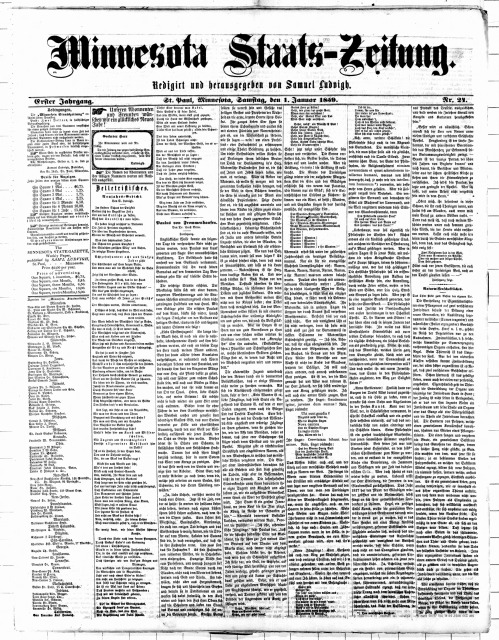Minnesota Staats-Zeitung
Minnesota Staats-Zeitung (St. Paul, Minn.) 1858-1877 Browse the title
Visiting Minnesota in 1858 to promote his quarterly, Die Fackel (the Torch), the freethinker Samuel Gottlieb Ludvigh impressed Republicans in St. Paul seeking an editor for their German-language organ, Die Minnesota Deutsche Zeitung (the Minnesota German Newspaper). Accepting the position with the promise of substantial financial backing, Ludvigh changed the name of the paper to the Minnesota Staats-Zeitung (Minnesota State-Gazette) to mirror nationally renowned German-language newspapers of the same name in New York and Illinois. The first issue of the Minnesota Staats-Zeitung was published on July 24, 1858. Typically appearing on Saturdays, the four-page, seven-column weekly covered local, national, and international news of interest to German immigrants. After unsuccessful attempts to secure the promised financial support, Ludvigh was forced to sell the paper. On February 25, 1860, Charles Reuther and Christian Exel accepted publishing duties and hired Albert Wolff as editor. A "Forty-Eighter" who had been exiled from Germany for his support of the 1848 revolutions throughout Europe, Wolff had extensive newspaper experience, which included work with Die Minnesota Deutsche Zeitung. While Ludvigh had focused the Minnesota Staats-Zeitung on support for the ideas of secularism and equality among men, Wolff and his successors were engaged more broadly in liberal causes and typically identified with the Republican Party, especially after 1860. Notable attributes of Wolff’s tenure at the Minnesota Staats-Zeitung include the enthusiastic promotion of immigration to Minnesota and his original poems that appeared in almost every issue. Some scholars suggest that Wolff may have been the first German-American poet, although not necessarily a notable one. In March of 1864, Charles Reuther sold his interests to Christian Exel, who sold the paper a few months later to future Minnesota state representative Andrew Robert Kiefer. In September of 1866, after a three-year absence, Wolff returned to the Minnesota Staats-Zeitung with his business partner Theodor Sander. They expanded the newspaper’s format to eight pages and six columns. On August 27, 1867, Wolff and Sander launched, in addition, a four-page, six-column tri-weekly edition under the same name, emphasizing national news coverage in an effort to expand their readership across the state. When Wolff became State Commissioner for Immigration from Germany in March 1869, Sander continued as the sole publisher.

Of principal interest to researchers is the Minnesota Staats-Zeitung’s coverage of the contentious 1860 elections, which is crucial to understanding German-American political influence in the years leading up to the Civil War. The newly established Republican Party felt it could count on German support in view of the results of previous elections. However, the Republican Party’s hesitancy to support abolitionism angered many Germans as did the Know Nothing Party’s discriminatory "two-year amendment" in Massachusetts, which required a waiting period before naturalized citizens were allowed to vote. The threat of losing their votes ultimately led Republicans to promote the "Dutch plank," endorsing the Homestead Act of 1860 and opposing voting restrictions for naturalized citizens, ultimately securing for their party the bulk of the German-American vote. In general, the Minnesota Staats-Zeitung supported German candidates running for office and urged Republicans and Democrats to accommodate the concerns of German-Americans.
In 1877, both editions of the Minnesota Staats-Zeitung merged with another St. Paul newspaper, the Minnesota Volksblatt (Minnesota People’s Journal). Renamed the Wöchentliche Volkszeitung (Weekly People’s Newspaper) in 1881, it included representatives of both papers, including Albert Wolff, who worked as editor until his death in 1893.